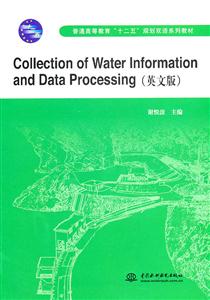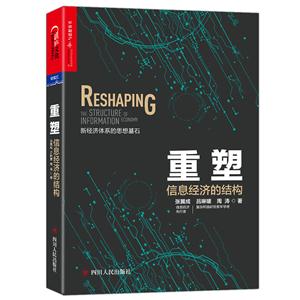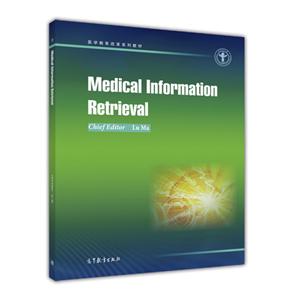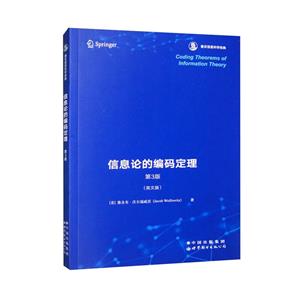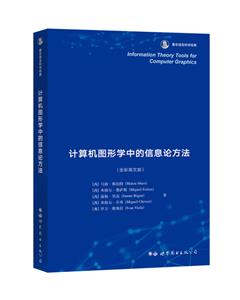
作者:Te Sun Han[著]
页数:17,538页
出版社:世界图书出版公司
出版日期:2023
ISBN:9787519296896
电子书格式:pdf/epub/txt
内容简介
《信息论的信息谱方法》由2010年获得被称为“信息领域的诺贝尔奖”的信息论领域最高荣誉——香农奖的韩太舜(Te Sun Han)所著,他任职于日本电气通信大学,发表了多篇论文与多部作品。
本书聚焦于任意非平稳的非遍历信源和信道,很好地补充了现有文献在信息论和编码理论方面内容的不足。本书有三大特点:一是别具特色的讲述方式——虽然内容主题比较常见,但作者在阐述各种概念定理时采用了非传统的方式,让人眼前一亮;二是作者广阔的知识面和独特的思维为许多问题提供了新的见解,富有原创性;三是本书的内容丰富详实,还包含了相当多的历史评论和大量的参考书目,为读者进一步阅读拓展知识面提供了参考书目。
作者简介
韩太舜(Te Sun Han),任职于日本电气通信大学,2010年获得信息论领域最高容易,被称为“信息领域的诺贝尔奖”的香农奖,发表了多篇论文与多部作品。
目录
1 Source Coding
1.1 Source Coding: Fixed-Length Codes
1.2 Source Coding: Variable-Length Codes
1.3 Coding for General Sources: Fixed-Length Codes
1.4 Fixed-Length Coding for Mixed Sources
1.5 Strong Converse Theorem for Source Coding
1.6 ε-Source Coding
1.7 Coding for General Sources: Variable-Length Codes
1.8 Coding for General Source: Weak Variable-Length Codes
1.9 Source Coding and Large Deviation: Decoding Error Probability
1.10 Source Coding and Large Deviation: Probability of Correct Decoding
1.11 Reliability Functions of the General Source with Variable-Length Coding
1.12 Information Spectrum and Invariancy
2 Random Number Generation
2.1 Random Number Generation
2.2 Resolvability and Intrinsic Randomness
2.3 Strong Converse Theorem for Random Number Generation
2.4 δ-Random Number Generation
2.5 Variable-Length Intrinsic Randomness
2.6 Random Number Generation and Source Coding
3 Channel Coding
3.1 Channel Coding: Stationary Memoryless Channel
3.2 Coding for General Channel
3.3 Coding for Mixed Channels
3.4 ε-Channel Coding
3.5 Strong Converse Theorem on Channel Coding
3.6 Channel Capacity with Cost Constraint
3.7 Strong Converse Property of Channel with Cost Constraint
3.8 Joint Source-Channel Coding
3.9 Separation Theorems of the Traditional Type
4 Hypothesis Testing
4.1 Hypothesis Testing
4.2 ε-Hypothesis Testing
4.3 Strong Converse Theorem for Hypothesis Testing
4.4 Hypothesis Testing and Large Deviation Probability ofTesting Error
4.5 Hypothesis Testing and Large Deviation: Probability ofCorrect Testing
4.6 Generalized Hypothesis Testing
4.7 Hypothesis Testing and Source Coding
5 Rate-Distortion Theory
5.1 Coding Subject to Distortion Criterion
5.2 Rate-Distortion Theory for Stationary Memoryless Sources
5.3 General Rate-Distortion Theory
5.4 Rate-Distortion Function Rfm(DX)
5.5 Rate-Distortion Function Rfa(DX)
5.6 Rate-Distortion Function Rum(DX)
5.7 Rate-Distortion Function Rua(DX)
5.8 Rate-Distortion for Stationary Memoryless Sources Revisited
5.9 Rate-Distortion for Stationary Ergodic Sources
5.10 Rate-Distortion Function for Mixed Sources
6 Identification Code and Channel Resolvability
1.1 Source Coding: Fixed-Length Codes
1.2 Source Coding: Variable-Length Codes
1.3 Coding for General Sources: Fixed-Length Codes
1.4 Fixed-Length Coding for Mixed Sources
1.5 Strong Converse Theorem for Source Coding
1.6 ε-Source Coding
1.7 Coding for General Sources: Variable-Length Codes
1.8 Coding for General Source: Weak Variable-Length Codes
1.9 Source Coding and Large Deviation: Decoding Error Probability
1.10 Source Coding and Large Deviation: Probability of Correct Decoding
1.11 Reliability Functions of the General Source with Variable-Length Coding
1.12 Information Spectrum and Invariancy
2 Random Number Generation
2.1 Random Number Generation
2.2 Resolvability and Intrinsic Randomness
2.3 Strong Converse Theorem for Random Number Generation
2.4 δ-Random Number Generation
2.5 Variable-Length Intrinsic Randomness
2.6 Random Number Generation and Source Coding
3 Channel Coding
3.1 Channel Coding: Stationary Memoryless Channel
3.2 Coding for General Channel
3.3 Coding for Mixed Channels
3.4 ε-Channel Coding
3.5 Strong Converse Theorem on Channel Coding
3.6 Channel Capacity with Cost Constraint
3.7 Strong Converse Property of Channel with Cost Constraint
3.8 Joint Source-Channel Coding
3.9 Separation Theorems of the Traditional Type
4 Hypothesis Testing
4.1 Hypothesis Testing
4.2 ε-Hypothesis Testing
4.3 Strong Converse Theorem for Hypothesis Testing
4.4 Hypothesis Testing and Large Deviation Probability ofTesting Error
4.5 Hypothesis Testing and Large Deviation: Probability ofCorrect Testing
4.6 Generalized Hypothesis Testing
4.7 Hypothesis Testing and Source Coding
5 Rate-Distortion Theory
5.1 Coding Subject to Distortion Criterion
5.2 Rate-Distortion Theory for Stationary Memoryless Sources
5.3 General Rate-Distortion Theory
5.4 Rate-Distortion Function Rfm(DX)
5.5 Rate-Distortion Function Rfa(DX)
5.6 Rate-Distortion Function Rum(DX)
5.7 Rate-Distortion Function Rua(DX)
5.8 Rate-Distortion for Stationary Memoryless Sources Revisited
5.9 Rate-Distortion for Stationary Ergodic Sources
5.10 Rate-Distortion Function for Mixed Sources
6 Identification Code and Channel Resolvability

